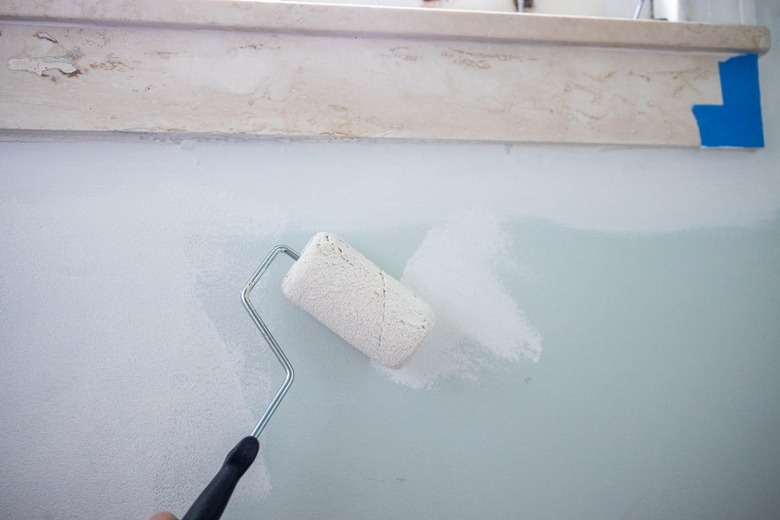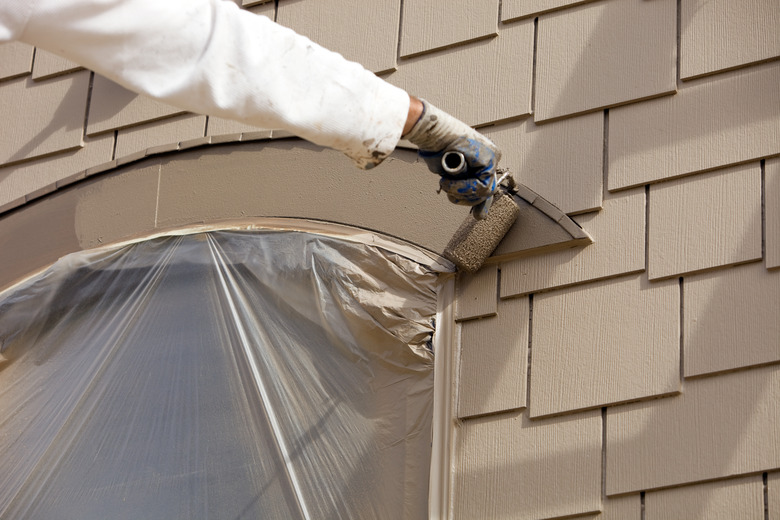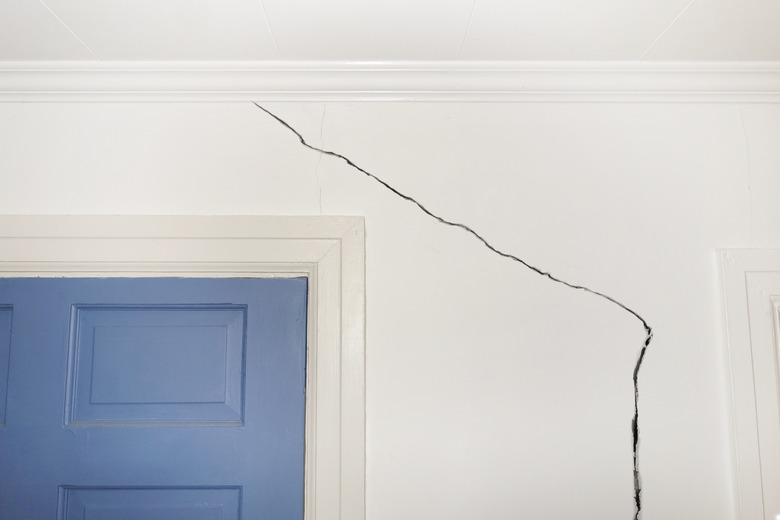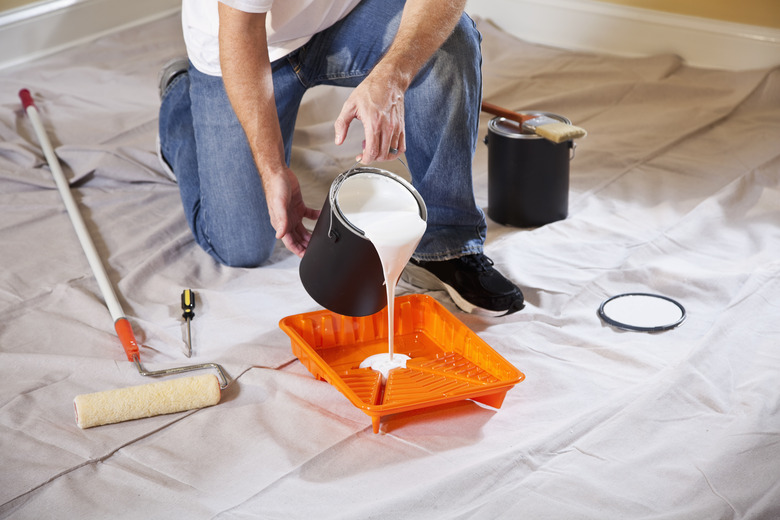Hire A Painter, Or Do It Yourself? Here Are 8 Things To Consider
We may receive a commission on purchases made from links.
Much of the time, homeowners can get a paint job done and done well without a professional painter. The key to doing so is patience. Prepping and painting aren't difficult jobs, but they do require careful work. There are a few situations, however, when a pro is worth every penny. This is particularly true when time is a factor.
So, should you hire a painter or do it yourself? Here are eight things to consider before you make the final decision.
1. Whether You Have Chipped Old Paint
1. Whether You Have Chipped Old Paint
Homes built before 1978 may contain lead paint, which can cause safety concerns. The presence of lead does not automatically spell trouble, however, so don't ditch your DIY plans just yet. Lead paint is not a problem if it's in good condition. However, the lead in paint becomes an issue if the paint is chipped or ingested, which may occur when small children mouth windowsills or other lead-painted surfaces. It can also pose a problem if you sand the paint and create airborne dust particles.
If your current paint is in good condition, you can simply go over it with a fresh coat of paint without worry. When the existing paint chips, cracks, or flakes, however, test the paint for the presence of lead using an at-home kit. If the paint tests positive for lead, you can call a remediation professional or pro painters for help. You can also sand away the lead paint yourself if you take certain safety precautions and follow all local regulations.
2. Exterior Versus Interior Jobs
2. Exterior Versus Interior Jobs
Most interior paint jobs are fairly benign, but exterior painting can prove tricky for DIYers. The most important consideration is weather. You can't paint in all conditions, and even a beautiful, cloudless day can be challenging (it's not good to paint in direct sunlight). A professional crew can paint most houses in a day or two, which is much less time than a DIYer. If you have to wait for good weather, your week-long project can easily stretch into months.
Another thing that can make exterior painting more challenging is inconsistent lighting, especially if you're painting a similar color that makes it hard to spot skippers. Dew and other normal daily conditions can cause problems with paint adhesion as well. These are problems a pro can likely work around better than you can.
Building height is an important consideration too. You can probably paint the outside of a one-story home yourself. Painting a second or third story may require extension ladders, scaffolding, and safety equipment. In this instance, it's best to hire professional painters. They already have the necessary equipment and know how to use it safely.
3. Your Fitness Level
3. Your Fitness Level
Although often overlooked when deciding whether to paint yourself, it's important to take into account your physical condition before tackling a paint job. Painting and cutting in around the ceiling means you'll be up and down a ladder quite a bit. Painting baseboards means crawling around on the floor (and the harder part: getting back up from the floor).
There's no shame in taking frequent breaks and working slowly if you need to, but be honest with yourself about how the job may affect you. Minor aches and pains are easily solved with a little ibuprofen, but you don't want your back or a knee to give out in the middle of the job. If you think painting will prove painful, call a professional painter.
4. The Costs
4. The Costs
This is where things get tricky. When you hire a professional painter, about 85 percent of the cost is labor. As such, it would seem that you can save quite a lot by doing the job yourself. And you can, but how much you save partly depends on how many paint supplies are already in your garage. If you've painted before, you may already have some paint trays, rollers, brushes, painter's tape, drop cloths, and other painting supplies.
If you need to buy supplies for the first time, or replace old and worn supplies, your DIY costs can climb rapidly. You're still likely to come in well under the cost of a professional job, but you may not save as much as you thought. Remember to take these costs into account when weighing the budget.
Tip
When you go shopping for paint, you'll quickly notice that 5-gallon buckets are cheaper than buying 1 gallon of paint at a time. Think twice before you go this route. These buckets are very heavy and difficult to work with when filling paint trays and other containers. Sometimes, the cost of a smaller quantity is well worth the money.
5. Project Time Constraints
5. Project Time Constraints
A professional painter is going to finish your paint job faster than you can. It's just a simple fact that someone who paints all day every day is going to be faster than you. This may not matter if you're painting a nursery or bedroom and have some time. It could be a problem, however, if you're painting a complex room, like a kitchen (which needs to continue functioning while you paint), or large areas of ceiling — not to mention painting the entire exterior of your house.
You might be able to knock out a small room over a weekend, but larger rooms and large amounts of trim make the job slower and so do jobs that require a lot of prep work. If time is an issue, you'll be better off hiring a professional painter.
6. Wall Damage
6. Wall Damage
Don't let cracks and nail holes scare you away from a DIY paint job. Painters will often tell you that preparation is important, and it is. But they often make fixing imperfections sound much more difficult than it is. It's very easy to smooth some spackle over nail holes and cracks. If you do make a mistake, you can easily sand or sponge away the spackle and try again. You can absolutely handle a few small imperfections.
Things do get more difficult if you have to patch large sections of a wall or ceiling. If a water leak or household repair left you with a larger hole to patch, a professional painter is a good idea. If desired, you can also call in a drywaller or plasterer to fix the wall for you and then still do the painting yourself. A novice repair of larger wall sections can be quite noticeable after painting, so it's best not to risk it.
7. The Amount of Painting
7. The Amount of Painting
Revamping a room or two isn't a major ordeal, but painting the entire house can be. If, for example, you just bought a house and hate all the paint colors the previous owner chose, professional painters are the best way to solve the problem. They can get the entire job done quickly and do it all at once so you're not in a constant state of chaos until you have time to paint every room. If possible, you can even get the painting done before you move in and have to work around all of your stuff.
8. How Indecisive You Are
8. How Indecisive You Are
Every once in a while, paint looks fantastic on a swatch but horrible on the wall. This isn't super common, but it does happen. If you're prone to indecision, consider painting yourself. You'll still have to pay for new paint, but you won't have to pay labor charges for a professional painter to repaint an area that was already finished.
Other Reasons to Call a Professional Painter
Other Reasons to Call a Professional Painter
Though painting is generally one of the simplest DIY tasks a homeowner can tackle, there are a few occasions where it's best to just go ahead and call in a pro:
- Painting a room with high ceilings: Special ladders and equipment are required to paint high ceilings safely, so call a pro for this job. You'll also want to hire a pro if you have a fussy eye.
- A job with high-end finishes: High-gloss lacquer finishes, such as on cabinets, are typically sprayed on and need a professional's touch. Lacquers and high-gloss finishes tend to show every imperfection, so you'll want a pro to apply both the finish and the paint underneath it.
- Odd or dangerous spaces: Reaching the ceiling in a stairwell, for instance, can be as tricky as it is dangerous. If you have a ladder designed to work with steps, you'll probably be fine. Don't try dangerous tricks with a regular ladder, though. If you can't get to it safely, call for professional help.
- Using oil-based paint: Unlike latex, oil-based paints require using chemicals like paint thinner to clean up. Different areas have different rules about disposing of these chemicals after you use them. Depending on what your area requires, it may be easier to let a professional painter worry about the cleanup and disposal.
Lastly, a pro can give you a great paint job with straight edges every time, and you probably won't notice any minor imperfections even if they exist. If you paint the room yourself, however, you will know where every mistake is located no matter how miniscule. Some people find their eyes drawn to these mistakes every time they enter the room. If a minor DIY imperfection is going to make you crazy, hire a professional.



